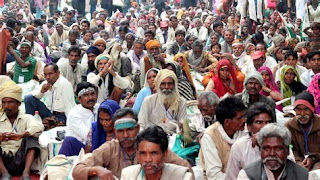4. Social Organization
Dense populations give rise to complex social organizations. This is so of necessity as so many people living in close proximity need to structure their relations tightly to make life liveable and enable society to function. The people in these 40 provinces, then, highly value the group as opposed to the individual. They are collectivist places, where few make a decision without looking sideways to see what their significant others think. Individuals are often not even in a position to make decisions for themselves anyway. A parent (even for an adult), a brother or a husband may be the decision-maker. There is no question of making up one's own mind for such people. Issues of ultimate allegiance can be perceived very strongly as constituting a threat to the very existence of the group, or even society as a whole, making the consideration of such a change a very serious thing indeed. Paul Hiebert and his daughter Eloise Hiebert Meneses consider social organization to be of such importance that they structured an entire book on church planting around social categories.
Serious study of social organization is absolutely essential to understanding the host communities among whom one is working. And it is important on a strategic level too. I have written an article ("Recasting Evangelization Ethnicity, Kinship, Religion and Territory: Identifying Communities in South Asia") which challenges the way the Joshua Project (and other such lists) handles the phenomenon of caste. The caste system (which is the social structure of South Asia and thereby of many of these provinces) is exceedingly complex and the sociological interpretation of caste highly contentious. Suffice it to say that in my article I argue that single castes groups such as Potters do not constitute a community and therefore should not be considered the strategically significant entity.
5. Cities
One might be forgiven for thinking that the great cities found in many of the 40 provinces, such as Delhi, Kolkata, Karachi, Dhaka and Beijing, are the product of recent modernization. But this would be far from the truth, although modernization and globalization have massively increased their size. These cities are the product of centuries of development that would not be possible were it not for the four phenomena I have outlined above. Cities are the cultural product of societies that have an excess of food to requirement, which can be traded and taxed and used to support large numbers of people who are not directly involved in food production. These are therefore free to innovate, organize others, create art, explore science, and develop systems of ideas, myths and rituals to make sense of it all.
Furthermore, the biggest migration in human history is going on right now in the massive move to the cities as the world's emerging economies like India and China increasingly become major players in the global market place. The cities in these provinces, then, have become places of enormous human suffering as well as amazing openness to the gospel. Sadly, however, missions have often been slow to adjust to this momentous shift. Today's gospel messengers must focus on the cities, and be serious to address the multiple needs of the urban poor who have flocked to form their great bastis and shanty towns. The quiet rural life, for most of this century's gospel messengers, is not an option.
6. Religion and Culture
These provinces are most significant, then, as the cradles of the great global systems we call the 'world religions'. Though Islam was birthed in the desert a very high percentage of the world's Muslims are found in these 40 places. Likewise for Hindus and Buddhists. These places, then, are the great bastions of the three great religious systems that have traditionally been perceived by Christian missions as massive obstacles for their message. Moreover, efforts to differentiate between culture and religion in these places, in the hope that one might accept the one while rejecting the other, prove exceedingly complex and ultimately unsatisfying as so often the one turns out to be the flip side of the other.
As in the need to learn the host community's history the importance of in-depth understanding of their religion and culture cannot be overstated. It is only as the religious and cultural context is understood that careful contextualization of the gospel can be possible. This will inevitably lead to conflict as many Christians are not interested in such knowledge, preferring what they call the 'simple gospel'. Although I rejoice that such people are serious about sharing the Good News of Christ, I cannot but be deeply concerned for the long term health of any movement to Christ that emerges from such ministry.

No comments:
Post a Comment